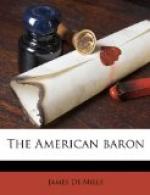And this was the result of his meditations.
He saw that Dacres was greatly excited, and had changed completely from his old self. His state of mind seemed actually dangerous. There was an evil gleam in his eyes that looked like madness. What made it more perplexing still was the new revulsion of feeling that now was manifest. It was not so much love for the child-angel as bitter and venomous hate for his wife. The gentler feeling had given place to the sterner one. It might have been possible to attempt an argument against the indulgence of the former; but what could words avail against revenge? And now there was rising in the soul of Dacres an evident thirst for vengeance, the result of those injuries which had been carried in his heart and brooded over for years. The sight of his wife had evidently kindled all this. If she had not come across his path he might have forgotten all; but she had come, and all was revived. She had come, too, in a shape which was adapted in the highest degree to stimulate all the passion of Dacres’s soul—young, beautiful, fascinating, elegant, refined, rich, honored, courted, and happy. Upon such a being as this the homeless wanderer, the outcast, looked, and his soul seemed turned to fire as he gazed. Was it any wonder?
All this Hawbury thought, and with full sympathy for his injured friend. He saw also that Dacres could not be trusted by himself. Some catastrophe would be sure to occur. He determined, therefore, to accompany his friend, so as to do what he could to avert the calamity which he dreaded.
And this was the reason why he went with Dacres to Rome.
As for Dacres, he seemed to be animated by but one motive, which he expressed over and over again:
“She stood between me and my child-angel, and so will I stand between her and her Italian!”
CHAPTER XIV.
THE ZOUAVE OFFICER.
Whatever trouble Ethel had experienced at Naples from her conviction that Hawbury was false was increased and, if possible, intensified by the discovery that he had followed them to Rome. His true motives for this could not possibly be known to her, so she, of course, concluded that it was his infatuation for Minnie, and his determination to win her for himself. She felt confident that he knew that she belonged to the party, but was so utterly indifferent to her that he completely ignored her, and had not sufficient interest in her to ask the commonest question about her. All this, of course, only confirmed her previous opinion, and it also deepened her melancholy. One additional effect it also had, and that was to deprive her of any pleasure that might be had from drives about Rome. She felt a morbid dread of meeting him somewhere; she did not yet feel able to encounter him; she could not trust herself; she felt sure that if she saw him she would lose all self-control,




